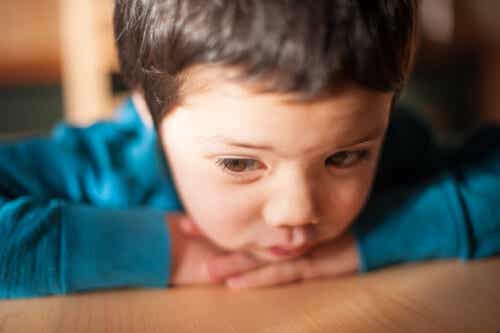Emotional Deprivation: Causes and Consequences


Written and verified by the pedagogue Marta Crespo Garcia
Emotional deprivation is something children shouldn’t experience in their lives. Since they’re born, children need their parents’ affection. This is the best way to develop a healthy self-esteem and the necessary confidence to become autonomous.
However, on certain occasions, children and teenagers suffer from lack of affection, and it may cause a negative impact on their development.
Emotional deprivation: causes and consequences
If children experience emotional deprivation during childhood, they may develop different psychological and psychopathological disorders. These problems might begin during childhood, but they may continue during adolescence and adulthood. This is why it’s so important to bond with your child and show affection from their first months of life.
What is emotional deprivation?
Emotional deprivation happens when there’s absence of emotional attention or response given to a child by their primary caregivers, from an early age. However, this doesn’t mean that there’s absolute absence of attention. In fact, this would be impossible.
So, children don’t spend enough quality time with their parents, and they don’t experience pleasant emotions. Therefore, children feel like they’re not loved or accepted, and thus, they become insecure. This lack of affection will have an impact on children’s emotional, physical and psychological development. As a result, they’ll end up having social problems and behaving in troublesome ways.

Therefore, it’s essential for children to feel their parents’ love. This way, they’ll develop a healthy self-esteem and the necessary confidence to become autonomous. However, this isn’t every child’s experience.
What are the causes of emotional deprivation?
Emotional deprivation or lack of attention can happen due to many reasons. The following are the most frequent causes:
- Neglect and abandonment.
- Hospitalization.
- Parents who get divorced and change partners repeatedly.
- Unwanted pregnancies.
- Dysfunctional families, with many problems, such as poor treatment, jealousy, drug addictions, prostitution, etc.
- Physical and emotional aggression.
- Broken families with parents arguing all the time.
- Extremely strict parents, who cause anxiety in their children.
- Extremely tolerant parents, who don’t set rules for their children.
Another important cause of emotional deprivation is the short time parents spend with their children due to their jobs. Many parents believe material needs are more important than emotional ones. Therefore, they spend more time working than giving them affection.
As a result, emotional deprivation will cause negative effects, which will have an effect on the child’s development, personality and social relations.
What are the consequences of emotional deprivation in children?
Among the different consequences of parents’ lack of affection, you may find growth delay and motor, cognitive and emotional disorders.
These disorders will be more or less serious, depending on different factors. Among the most important factors, we can talk about the children’s age, the period in which children lack affection and the type of emotion they don’t get to experience.

According to several authors, there are three different types of consequences:
Emotional consequences
- Separation and abandonment anxiety: children fear other people will stop loving them. In addition, they feel something important is missing. As a result, they don’t want to form new relationships, because they’re afraid of losing the person eventually.
- Greed for love: children ask for limitless affection. Furthermore, they doubt or misinterpret other people’s intentions.
- Aggressive reactions: the ambition and fear of losing other people’s love is so intense that everything seems frustrating. As a result, children make other people pay for their sufferings (real and imaginary), and test everyone’s love all the time.
- Passive attitude: children let people love them, but they don’t love people back. They’re self-centered and just want to be loved. At the same time, they’re passive and dependent. They only want to receive.
- Self-devaluation and low self-esteem: usually, children think they’re a failure and dislike themselves. They even think they’re not able to be loved by others. This is why they lack self-confidence.
- Low frustration tolerance: they think about limits and prohibitions as aggressions or injustices. They also find it hard to accept limits.
Somatic consequences
- Growth delay: children may experience physical growth delay. In fact, they may even be below average. Abandonment and sadness may cause children to stop eating and lose weight.
- They’re prone to suffer from diseases and accidents: children may have less resistance to infections. In fact, their defense mechanisms are less developed, due to their weak pulse of life.
- Alterations in their body perception: lack of affection doesn’t allow children to develop an organized body image of themselves. They may have motor coordination difficulties (for example, when playing sports). Furthermore, sometimes they present hyperactivity behavior.

Cognitive consequences
- Intellectual disability: this is due to the lack of socio-cultural stimulation during their early stages. Children who suffer from emotional deprivation tend to have lower intellectual abilities. As a result, they may have learning problems and poor school performance.
- Speech disorders: usually, these children suffer from speech disorders. In addition, they have articulation problems, and poor vocabulary and communications skills.
- Temporal disorientation: children find it hard to identify time in an objective way. They think pleasant times are too short, and unpleasant times last for too long.
Emotional deprivation in children
According to Vargas (2002), children tend to have problems in socializing with others. They develop poor social skills, they’re dependent and need to be constantly praised and approved by other people. In addition, they adopt other people’s behaviors as their own. They’re extremely indulgent, submissive, hostile and aggressive.
In conclusion, as we’ve seen before, there are many reasons for emotional deprivation. Therefore, it’s very important to show our children affection. Remember that some consequences aren’t just temporary. Some of them may last until adolescence and even adulthood.
Emotional deprivation is something children shouldn’t experience in their lives. Since they’re born, children need their parents’ affection. This is the best way to develop a healthy self-esteem and the necessary confidence to become autonomous.
However, on certain occasions, children and teenagers suffer from lack of affection, and it may cause a negative impact on their development.
Emotional deprivation: causes and consequences
If children experience emotional deprivation during childhood, they may develop different psychological and psychopathological disorders. These problems might begin during childhood, but they may continue during adolescence and adulthood. This is why it’s so important to bond with your child and show affection from their first months of life.
What is emotional deprivation?
Emotional deprivation happens when there’s absence of emotional attention or response given to a child by their primary caregivers, from an early age. However, this doesn’t mean that there’s absolute absence of attention. In fact, this would be impossible.
So, children don’t spend enough quality time with their parents, and they don’t experience pleasant emotions. Therefore, children feel like they’re not loved or accepted, and thus, they become insecure. This lack of affection will have an impact on children’s emotional, physical and psychological development. As a result, they’ll end up having social problems and behaving in troublesome ways.

Therefore, it’s essential for children to feel their parents’ love. This way, they’ll develop a healthy self-esteem and the necessary confidence to become autonomous. However, this isn’t every child’s experience.
What are the causes of emotional deprivation?
Emotional deprivation or lack of attention can happen due to many reasons. The following are the most frequent causes:
- Neglect and abandonment.
- Hospitalization.
- Parents who get divorced and change partners repeatedly.
- Unwanted pregnancies.
- Dysfunctional families, with many problems, such as poor treatment, jealousy, drug addictions, prostitution, etc.
- Physical and emotional aggression.
- Broken families with parents arguing all the time.
- Extremely strict parents, who cause anxiety in their children.
- Extremely tolerant parents, who don’t set rules for their children.
Another important cause of emotional deprivation is the short time parents spend with their children due to their jobs. Many parents believe material needs are more important than emotional ones. Therefore, they spend more time working than giving them affection.
As a result, emotional deprivation will cause negative effects, which will have an effect on the child’s development, personality and social relations.
What are the consequences of emotional deprivation in children?
Among the different consequences of parents’ lack of affection, you may find growth delay and motor, cognitive and emotional disorders.
These disorders will be more or less serious, depending on different factors. Among the most important factors, we can talk about the children’s age, the period in which children lack affection and the type of emotion they don’t get to experience.

According to several authors, there are three different types of consequences:
Emotional consequences
- Separation and abandonment anxiety: children fear other people will stop loving them. In addition, they feel something important is missing. As a result, they don’t want to form new relationships, because they’re afraid of losing the person eventually.
- Greed for love: children ask for limitless affection. Furthermore, they doubt or misinterpret other people’s intentions.
- Aggressive reactions: the ambition and fear of losing other people’s love is so intense that everything seems frustrating. As a result, children make other people pay for their sufferings (real and imaginary), and test everyone’s love all the time.
- Passive attitude: children let people love them, but they don’t love people back. They’re self-centered and just want to be loved. At the same time, they’re passive and dependent. They only want to receive.
- Self-devaluation and low self-esteem: usually, children think they’re a failure and dislike themselves. They even think they’re not able to be loved by others. This is why they lack self-confidence.
- Low frustration tolerance: they think about limits and prohibitions as aggressions or injustices. They also find it hard to accept limits.
Somatic consequences
- Growth delay: children may experience physical growth delay. In fact, they may even be below average. Abandonment and sadness may cause children to stop eating and lose weight.
- They’re prone to suffer from diseases and accidents: children may have less resistance to infections. In fact, their defense mechanisms are less developed, due to their weak pulse of life.
- Alterations in their body perception: lack of affection doesn’t allow children to develop an organized body image of themselves. They may have motor coordination difficulties (for example, when playing sports). Furthermore, sometimes they present hyperactivity behavior.

Cognitive consequences
- Intellectual disability: this is due to the lack of socio-cultural stimulation during their early stages. Children who suffer from emotional deprivation tend to have lower intellectual abilities. As a result, they may have learning problems and poor school performance.
- Speech disorders: usually, these children suffer from speech disorders. In addition, they have articulation problems, and poor vocabulary and communications skills.
- Temporal disorientation: children find it hard to identify time in an objective way. They think pleasant times are too short, and unpleasant times last for too long.
Emotional deprivation in children
According to Vargas (2002), children tend to have problems in socializing with others. They develop poor social skills, they’re dependent and need to be constantly praised and approved by other people. In addition, they adopt other people’s behaviors as their own. They’re extremely indulgent, submissive, hostile and aggressive.
In conclusion, as we’ve seen before, there are many reasons for emotional deprivation. Therefore, it’s very important to show our children affection. Remember that some consequences aren’t just temporary. Some of them may last until adolescence and even adulthood.
All cited sources were thoroughly reviewed by our team to ensure their quality, reliability, currency, and validity. The bibliography of this article was considered reliable and of academic or scientific accuracy.
- González, E. (2002). Educar en la afectividad. Madrid, Universidad Complutense de Madrid, 2. http://www.surgam.org/articulos/504/12%20EDUCAR%20EN%20LA%20AFECTIVIDAD.pdf
- León, A. M. (2005). Teorías y conceptos asociados al estudio de las migraciones internacionales. Trabajo social, (7), 59-76. https://revistas.unal.edu.co/index.php/tsocial/article/view/8476/9120
- León-Pérez, T., Rodríguez-Herrera, F., Maria-Gutierrez, J., Quiñones-Colarte, R. E., Fabelo-Roche, J. R., & Shelton-Borges, H. (2021). Alteraciones psicológicas en niños con padres ausentes por emigración. 16 de Abril, 60(282), 1426. http://www.rev16deabril.sld.cu/index.php/16_04/article/view/1426/703
- López Navarrete, G. E. (2019). Niños en situación de guerra. http://189.203.43.34:8180/bitstream/20.500.12103/1762/1/ActPed2007-14.pdf
- Retamal, C. M. (2020, October). Salud mental de los niños, niñas y adolescentes en situación de confinamiento. In Anales de la Universidad de Chile (No. 17, pp. 303-318). https://nuevosfoliosbioetica.uchile.cl/index.php/ANUC/article/download/58931/62440
- Vargas, J. (2002). Enfoques teóricos de la transmisión intergeneracional. Revista Electrónica de Psicología Iztacala. Recuperado de: http://www.iztacala.unam.mx/ carreras/psicologia/psiclin/vol5num2/ ArticuloIntergeneraciional.htm
This text is provided for informational purposes only and does not replace consultation with a professional. If in doubt, consult your specialist.








